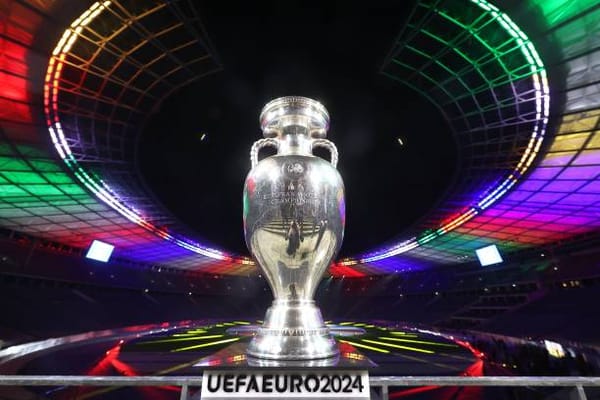In Brief
- The Euros began in 1960 with a four-team final tournament, expanding to 24 teams by 2016.
- The competition consists of a group stage and a knockout stage. The group stage involves six groups of four teams, with the top teams advancing to the knockout rounds, including the Round of 16, quarter-finals, semi-finals, and final.
- Germany and Spain hold the record for the most titles, each winning three times. Germany (1972, 1980, 1996) and Spain (1964, 2008, 2012).
- Countries like Luxembourg and Lithuania have never qualified for the Euros, while nations like England and the Netherlands have participated but have not consistently won the tournament, with England's sole win in 1968 and the Netherlands in 1988.
- Hosting the Euros brings significant economic benefits through infrastructure development and tourism. The tournament also fosters European unity and showcases the continent's football talent.
IN DETAIL
Berlin, Germany-The UEFA European Championship, commonly known as the Euros, is one of the most prestigious international football tournaments in the world. Organized by the Union of European Football Associations (UEFA), it has been showcasing Europe's top football talent since its inception in 1960.
A Brief History
The Euros began in 1960 with a modest four-team final tournament, expanding over the years to include 24 teams by 2016. The competition has grown significantly, becoming a major event in the football calendar.
Tournament Format
The tournament is divided into two main stages: the group stage and the knockout stage. During the group stage, 24 teams are split into six groups of four. Each team plays three matches, and the top two teams from each group, along with the four best third-placed teams, advance to the knockout stage. The knockout stage then proceeds with the Round of 16, quarter-finals, semi-finals, and the final. If a match is tied at the end of regular time, it goes into extra time, and if necessary, a penalty shootout decides the winner.
Record Holders
Germany and Spain hold the record for the most titles, each winning the tournament three times. Germany's victories came in 1972, 1980, and 1996, while Spain won in 1964, 2008, and 2012. France has won the Euros twice, in 1984 and 2000.
Participation and Challenges
All European countries have the opportunity to qualify for the Euros, with several notable absences and near-misses. For instance, nations like Luxembourg and Lithuania have never qualified for the tournament. Conversely, countries like England and the Netherlands have reached the final stages but have not consistently secured titles, with England winning only once in 1968 and the Netherlands in 1988.
Beyond the Pitch
The Euros' influence extends beyond football. The tournament promotes European talent, with many players gaining international recognition and opportunities. Hosting the Euros brings significant economic benefits to the host country, including infrastructure development and increased tourism. Moreover, the event serves as a celebration of European unity and culture, fostering a sense of pride across the continent.
The UEFA European Championship continues to be a beacon of European football, illustrating the continent's passion for the sport and its potential on the global stage. As the tournament evolves, it remains a vital part of Europe's cultural and sporting identity.

